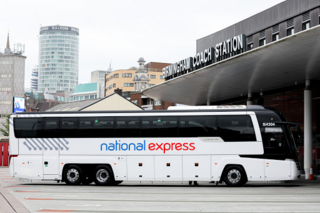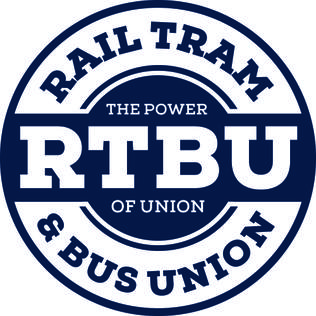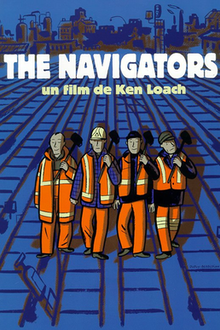
Mobico Group, formerly National Express Group, is a British multinational public transport company with headquarters in Birmingham, England. Domestically it currently operates bus and coach services under brands including National Express. The company also operates transport services including trains abroad: in the Republic of Ireland, United States, Canada, Spain, Portugal, Malta, Germany, Bahrain, and Morocco, and long-distance coach services across Europe.

Southern is the brand name used by the Govia Thameslink Railway (GTR) train operating company on the Southern routes of the Thameslink, Southern and Great Northern franchise in England. It is a subsidiary of Govia, a joint venture between transport groups Go-Ahead and Keolis, and has operated the South Central franchise since August 2001 and the Gatwick Express service since June 2008. When the passenger rail franchise was subsumed into GTR, Southern was split from Gatwick Express and the two became separate brands, alongside the Thameslink and Great Northern brands.

The Railways Act 1993 was introduced by John Major's Conservative government and passed on 5 November 1993. It provided for the restructuring of the British Railways Board (BRB), the public corporation that owned and operated the national railway system. A few residual responsibilities of the BRB remained with BRB (Residuary) Ltd.
The privatisation of British Rail was the process by which ownership and operation of the railways of Great Britain passed from government control into private hands. Begun in 1994, the process was largely completed by 1997. The deregulation of the industry was in part motivated by the enactment of EU Directive 91/440 in 1991, which aimed to create a more efficient railway network by creating greater competition.

Connex Melbourne was a train operator in Melbourne, Australia. Formed in July 1998 as Hillside Trains, a business unit of the Public Transport Corporation, it was privatised in August 1999 becoming a subsidiary of Connex.

The British RailClass 411 (4CEP) electric multiple units were built at Eastleigh works from 1956–63 for the newly electrified main lines in Kent. These units, which used a British Railways Mark 1 bodyshell, were based on the earlier Southern Railway 4 COR design, built in 1937. Variants of the class 411 design included the class 410 and class 412 4 BEP units, which contained a buffet car in place of a standard trailer. They were later used on services in Sussex and Hampshire; following the privatisation of British Rail in 1995, the units were used by the Connex South Central, Connex South Eastern and South West Trains franchises. They were replaced by Juniper, Desiro, and Electrostar units. The fleet's lifespan was 49 years. These units are the longest-lived BR Mark 1 EMUs.

Gandy dancer is a slang term used for early railroad workers in the United States, more formally referred to as section hands, who laid and maintained railroad tracks in the years before the work was done by machines. The British equivalents of the term gandy dancer are navvy, originally builders of canals, or inland navigations, for builders of railway lines, and platelayer for workers employed to inspect and maintain the track. In the Southwestern United States and Mexico, Mexican and Mexican-American track workers were colloquially traqueros.

The British Rail Class 456 was an electric multiple unit passenger train introduced by Network SouthEast on inner-suburban services in South London to replace the elderly Class 416 2EPB units. Twenty-four two-car units were built by British Rail Engineering Limited's York Carriage Works in 1990 and 1991.

Maintenance of way refers to the maintenance, construction, and improvement of rail infrastructure, including tracks, ballast, grade, and lineside infrastructure such as signals and signs.

Eden Park railway station serves Eden Park in the London Borough of Bromley in south east London, in Travelcard Zone 5. It is therefore possible to use an Oyster card at the station. It is 12 miles 34 chains (20.0 km) down the line from London Charing Cross. The station and all trains serving it is operated by Southeastern on the Hayes line. The trains are electric, powered by a third rail.

Forest Gate railway station is on the Great Eastern Main Line serving Forest Gate in the London Borough of Newham, east London. It is 5 miles 21 chains (8.5 km) down the line from London Liverpool Street and is situated between Maryland and Manor Park. Its three-letter station code is FOG and it is in fare zone 3.

A motive power depot (MPD) or locomotive depot, or traction maintenance depot (TMD), is where locomotives are usually housed, repaired and maintained. They were originally known as "running sheds", "engine sheds" or just "sheds". Facilities are provided for refuelling and the replenishing of water, lubricating oil and grease and, for steam engines, the disposal of ash. There are often workshops for day-to-day repairs and maintenance, but locomotive building and major overhauls are usually carried out at locomotive works.
Shildon railway works opened in 1833 in the town of Shildon in County Durham, England. Originally built to serve the Stockton and Darlington Railway the works grew to cover 40 acres (16 ha), employing 2750 staff.
The Southern Region was a region of British Railways from 1948 until 1992 when railways were re-privatised. The region ceased to be an operating unit in its own right in the 1980s. The region covered south London, southern England and the south coast, including the busy commuter belt areas of Kent, Sussex and Surrey. The region was largely based upon the former Southern Railway area.

Immingham engine shed, also known as Immingham depot, or more recently as Immingham TMD and always locally as Loco is a railway maintenance depot located on the Immingham Dock estate, in North East Lincolnshire, England. The depot code is IM.

Passenger rail franchising in Great Britain is the system of contracting the operation of the passenger services on the railways of Great Britain to private companies, which has been in effect since 1996 and was greatly altered in 2020, with rail franchising being effectively abolished in May 2021.
Robert "Rob" Dawber was a British railwayman turned writer whose script for the film The Navigators was commissioned by director Ken Loach and shot in Sheffield, where Dawber lived. He was a long-standing member of the Trotskyist group the Alliance for Workers' Liberty.

The Holgate Road carriage works was a railway carriage manufacturing factory in the Holgate area of York, England.

The Rail, Tram and Bus Union Victorian Branch or RTBU Victoria is the state branch of the RTBU in Victoria. Originally formed in 1993 as the Victorian branch of the Public Transport Union and renamed the RTBU in 1998, the RTBU Victoria today represents nearly 8000 members across Rail Operations, Tramways, Locomotive, Infrastructure and Administrative areas of Victoria's public transport industry.

Northern Trains, trading as Northern, is a publicly owned train operating company in England. It is owned by DfT OLR Holdings for the Department for Transport (DfT), after the previous operator Arriva Rail North had its franchise terminated at the end of February 2020.
















